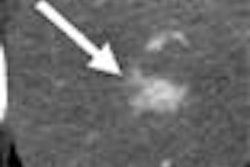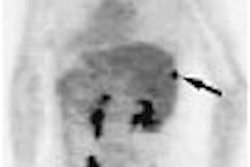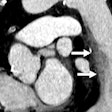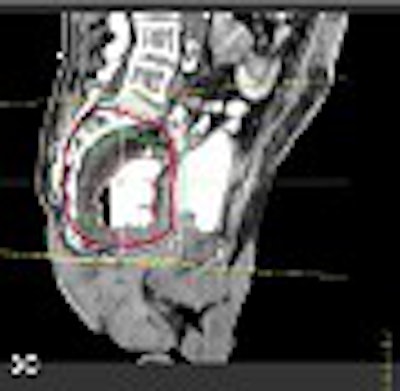
Chemotherapy prior to radiation shrank tumors sufficiently to allow doctors to perform curative surgery as well as sphincter-sparing procedures, according to a presentation at the 2004 Gastrointestinal Cancers Symposium in San Francisco.
"For our patients, the ability to avoid the need for a colostomy bag was a major quality-of-life issue," said principal investigator Dr. Andrew Kennedy, an oncologist at Wake Radiology Oncology Services in Cary, NC.
Twelve patients were pretreated with capecitabine for about a week before being administered radiation and irinotecan concurrently, Kennedy explained. CT-based 3-D treatment planning was used, as was digital radiography.
Of the 12 patients in the study, 10 responded to the treatment protocol and could be downstaged prior to surgery. Three of the 10 patients responded so well that they were able to undergo sphincter-sparing resection of the residual tumor, Kennedy said. One of the patients included a prominent TV anchorman from South America.
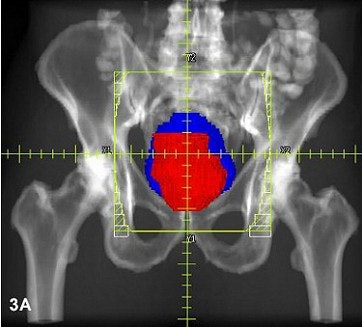 |
Three radiation fields (PA with right and left lateral) were used for all patients, using CT-based 3-D treatment planning. Rectum is red; bladder is blue.
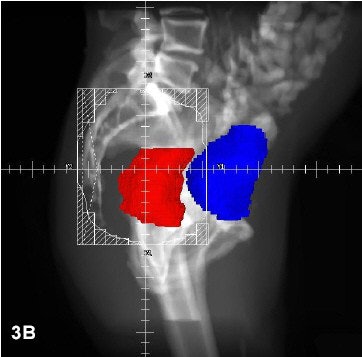 |
"He told me that he had to have the sphincter-sparing operation no matter what happened prior to surgery," Kennedy said. "As it turned out, he was one of the three patients who responded well enough to have that operation and he is now doing well."
Kennedy said this study was the first to report on the combination of irinotecan, radiation, and capecitabine in rectal cancer. "All other studies have looked at capecitabine alone. There is strong pre-clinical evidence to suggest that there is additive and maybe even synergistic action when capecitabine and irinotecan are combined with radiation," he explained.
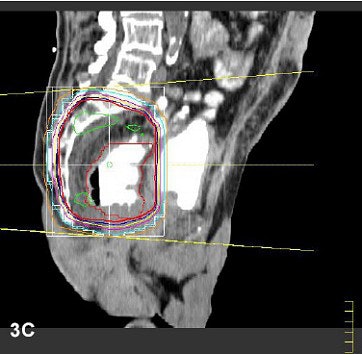 |
| The planning treatment volume included the primary tumor, presacral, and internal iliac lymphatics. Here, the thick red line represents 100% of the intended dose line, encompassing the targets. Images and captions courtesy of Dr. Andrew Kennedy. |
Kennedy said phase II studies are planned using capecitabine at 825 mg/m2 twice a day. The patients also received 40 mg/m2 of irinotecan and 50.4-Gray radiation doses. Further studies will also include the use of celecoxib and bevacizumab to see if these agents improve outcomes.
"Although not a large study, the significant downstaging without side effects makes this approach very appealing for presurgical or neoadjuvant treatment of all rectal cancers, especially the ones, like our patients in this study, that would need to have a permanent colostomy if the downstaging by chemoradiation wasn't significant," he said.
Commenting on the study, Dr. Harry Bleiberg said the data from Kennedy and colleagues was appealing given the high response rate. "However, preoperative radiation and chemotherapy has not been evaluated in terms of decreased tumor recurrence, progression-free survival, and overall survival. More patients are required to further demonstrate the activity of the combination," cautioned Bleiberg, who is the director of clinical research at the Jules Bordet Institute, Free University of Brussels in Belgium.
Kennedy suggested that possibly the most important aspects of his study were the adverse-effects profiles of the patients on the regimen. "Many patients we treated at the same time as these study patients were receiving standard pump infusion of 5-fluorouracil (5-FU) in a protracted venous infusion, and nearly all had major side effects requiring a break in treatment, and multiple medication to control diarrhea, cramps, pain, nausea, etc., and had more significant fatigue than the study patients."
By Edward SusmanAuntMinnie.com contributing writer
February 25, 2004
Related Reading
Guidelines revised for hereditary nonpolyposis colorectal cancer testing, February 18, 2004
Preoperative approach may benefit patients with locally advanced rectal cancer, February 6, 2004
Neoadjuvant concurrent chemoradiation improves outcome in rectal cancer, October 21, 2003
Copyright © 2004 AuntMinnie.com





